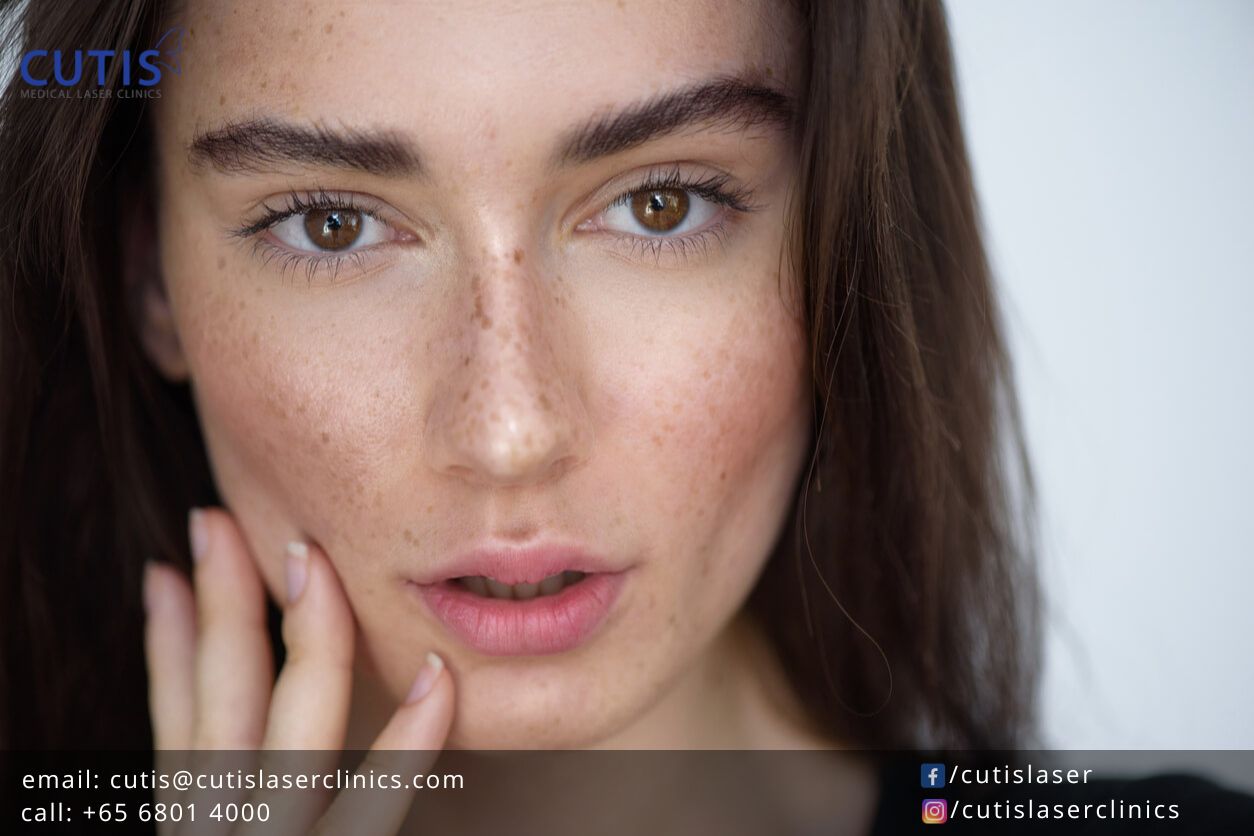One main concern with hyperpigmentation or dark spots is that they are stubborn to treat. It can take a few or several months for the blemishes to fade, but there are also cases where they reappear after treatment or do not lighten at all.

Continue reading as we discuss the reasons why hyperpigmentation happens or why it recurs even after successful treatment. We also offer an overview of our new depigmentation solution that can tackle various types of hyperpigmentation beyond the surface level.
Why does hyperpigmentation happen?
In essence, dark spots occur when there is an excess or overproduction of melanin (the pigment released by our skin cells). It can be caused by several factors, such as injury or trauma to the skin, acne, sun exposure, and hormonal changes (that can happen in pregnancy).
Hyperpigmentation is extremely common and most cases are harmless. Many, however, find it bothersome because it presents itself as darkened patches that can lead to an uneven complexion and dull skin appearance. Sun protection can help certain types of pigmentation fade on their own, but in other cases, aggressive treatments are needed.
Why does pigmentation recur or come back?
There are several reasons why dark spots return after treating them. Your lifestyle and hormones can play a part, which is why it is important to take better care of your skin and avoid things that can prevent further darkening of your blemishes.
Sun exposure – The ultraviolet light from the sun can cause dark spots to appear, as well as darken existing pigmentation. Prolonged and unprotected sun exposure can also cause premature skin aging and affect the end results of your aesthetic treatments or lead to unwanted side effects.
Hormones – Hormonal fluctuations can sometimes increase the production of melanin and darken your skin. Melasma, which presents itself as irregular patches of brown or brown-gray spots, is said to develop due to hormone changes caused by pregnancy or medications like oral contraceptives. UV light from sun exposure is also a common trigger for melasma.
Incorrect or aggressive treatment – Some lightening treatments take time to work. If you, for instance, stop using the product after seeing improvements, it is likely for the spots to occur. Aggressive treatments or using incorrect products may also cause recurrence or worsening of your pigmentation.
Our clinic’s new depigmentation treatment
At Cutis, we have Dermamelan®, which is a medical-grade depigmenting treatment that effectively removes stubborn pigmentation and prevents its recurrence. It has a double corrective and regulatory action that can lighten visible pigmentation, as well as regulate the overproduction of melanin to prevent the reformation of spots.
It can treat different types of hyperpigmentation that are resistant to other treatments. These include:
- Melasma
- Sun spots or solar lentigines
- Freckles
- Post-inflammatory hyperpigmentation
- Blotchy skin
Dermamelan targets the pigment buildup in the skin to reduce and eliminate blemishes of melanic origin. What it does is paralyzes melanin production without damaging the melanocytes (pigment-producing cells), so there is no risk of white spots or blemishes appearing. The treatment process involves two phases: the in-clinic and at-home phases.
- In-clinic phase – After the diagnosis, the treatment starts with the application of two masks with an intensive depigmentation action. You need to go home with the mask on your face.
- At-home phase – You’ll need to continue the treatment at home following an after-care guideline. This involves removing the masks after four hours and using the complimentary products provided for four months.
As there is always a tendency for the spots to reappear in certain areas, it is best to follow all the after-care guidelines and protect your skin from the sun. And while you can see significant changes within a week, you need to continue the treatment for four months to regulate or keep the overproduction of melanin under control.
Your skin may appear reddened and feel irritated after the treatment, but these are just mild and will subside within 24 to 48 hours. You may also experience some swelling in the first week, and mild to moderate flaking or skin shedding that can last for up to two weeks. After this process, new skin will emerge, with the final results seen six to nine months of treatment.
How to prevent hyperpigmentation
While you may not be able to prevent all causes of dark spots, there are some things you can do to prevent or reduce your risks of having them.
- Use SPF daily – Choose a broad-spectrum sunscreen with an SPF of at least 30. Apply it daily regardless of the weather to protect your skin against harmful UV rays.
- Limit or avoid sun exposure – This is especially true during the peak hours, between 10 am and 4 pm. Use an umbrella or sit under the shade when you need to go out.
- Accessorize – Wear wraparound glasses with UV protection to protect your eyes and the surrounding area. You can also wear a wide-brimmed hat to shade both your face and scalp.
- Don’t pick or pop your blemishes – Doing so prolongs the healing process and increases your risk of both scarring and post-inflammatory hyperpigmentation or PIH.
- Use products with vitamin C – Serums or creams with vitamin C can help fade dark marks and even your complexion. Vitamin C also has antioxidants and is known for its anti-aging and brightening capabilities.
Book a consultation today
Dermamelan® is just one of our non-invasive treatments for stubborn hyperpigmentation. We also have other procedures, including chemical peels, lasers, and dermabrasion that can help fade unsightly blemishes. Contact Cutis Medical Laser Clinics in Singapore today and schedule a consultation with our aesthetic doctor to find out which is right for you.
- If you would like to be an informed patient, please contact us at +65-6801-4000 or
hello@cutislaserclinics.com. - Cutis Medical Laser Clinics, 9 Scotts Road Pacific Plaza, Scotts Medical Center #08-07, Singapore – 228210
+65-6801-4000 - hello@cutislaserclinics.com
